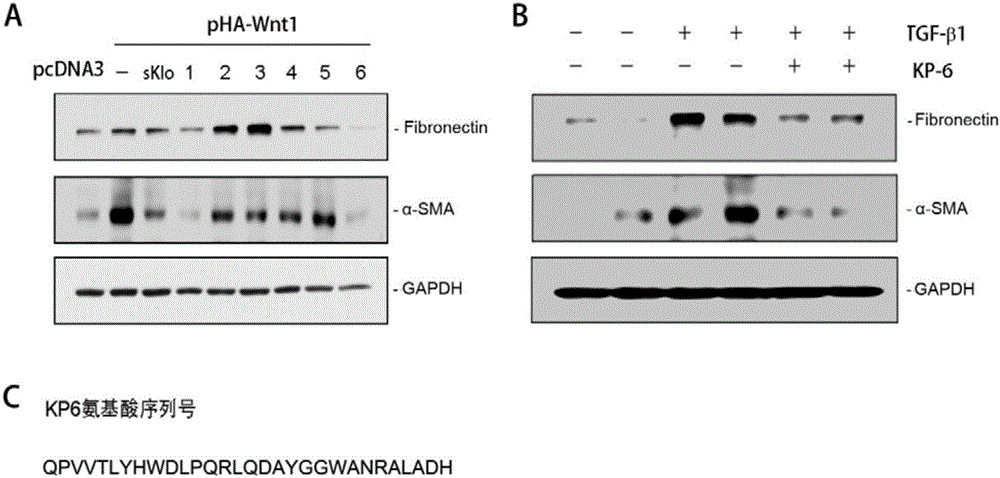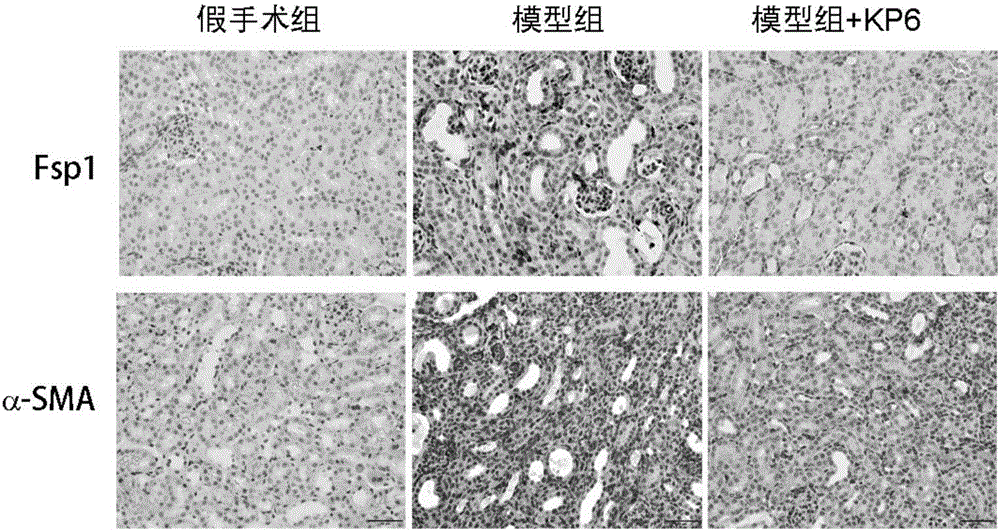Application of micromolecular polypeptide KP-6 in preparing drug for treating chronic kidney disease
A technology for small molecule peptides and chronic kidney disease, applied in the field of biomedicine
- Summary
- Abstract
- Description
- Claims
- Application Information
AI Technical Summary
Problems solved by technology
Method used
Image
Examples
Embodiment 1
[0023] Example 1: Screening of KP-6 Small Molecular Peptides
[0024] 1. Experimental materials:
[0025] Cells: Human renal tubular epithelial cells.
[0026] Culture medium: DMEM / F129 (1:1) culture medium containing 10% FBS.
[0027] Culture conditions: 37°C with 5% CO 2 incubator.
[0028] Small molecule peptide library: 18 peptide sequences were designed by computer, each with an average length of 30 amino acids, which were artificially synthesized by Nanjing GenScript Biotechnology Co., Ltd. to build a small molecule peptide library and conduct the following experiments.
[0029] 2. Experimental treatment:
[0030] (I) Cultured human renal tubular epithelial cells were mixed with 1.5×10 6 Planted in 6-well cell culture plate, cultured for 1 day, starved for 24 hours, and given 18 different small molecular polypeptides (10 μg / ml) 1 hour in advance. Then the Wnt1 plasmid was transfected, and the protein was harvested 24 hours later, and Western blot experiments were p...
Embodiment 2
[0037] Example 2: Inhibitory effect of small molecule polypeptide KP-6 on renal fibrosis in mouse UUO model
[0038] 1. Experimental animals: C57 mice, male and female matched, weighing 20-22g, SPF grade.
[0039]The animals were first weighed and numbered, and 12 healthy mice weighing 20-22 g were selected and randomly divided into 3 groups with 4 mice in each group. Including sham operation group, model control group and medication group.
[0040] 2. Experimental grouping
[0041] 1) Sham operation group: room temperature, 3% pentobarbital sodium anesthetized mice with 1ml / kg body weight, select the left abdomen 2-3cm as the incision; after local disinfection, cut the skin, subcutaneous, muscle layer and After the peritoneum was discovered, the left ureter was sutured layer by layer. After local disinfection, check the marks and place them in corresponding mouse cages.
[0042] 2) Model control group: anesthetized and disinfected as above. The skin, subcutaneous layer, ...
Embodiment 3
[0054] Example 3: Inhibitory effect of small molecule polypeptide KP-6 on renal fibrosis in mouse UIRI model
[0055] 1. Experimental animals: BABL / c mice, male, weighing 20-22g, SPF grade.
[0056] The animals were first weighed and numbered, and 18 healthy mice weighing 20-22 g were selected and randomly divided into 3 groups, 6 in each group. Including normal saline group, model control group and medication group.
[0057] 2. Experimental groups
[0058] 1) Sham operation group: room temperature, 3% pentobarbital sodium anesthetized mice with 1ml / kg body weight, select the left abdomen 2-3cm as the incision; after local disinfection, cut the skin, subcutaneous, muscle layer and The peritoneum was sutured layer by layer after the left renal pedicle was found. After local disinfection, check the marks and place them in corresponding mouse cages.
[0059] 2) Model control group: anesthetized and disinfected as above. Cut the skin, subcutaneous layer, muscle layer and peri...
PUM
 Login to View More
Login to View More Abstract
Description
Claims
Application Information
 Login to View More
Login to View More - R&D
- Intellectual Property
- Life Sciences
- Materials
- Tech Scout
- Unparalleled Data Quality
- Higher Quality Content
- 60% Fewer Hallucinations
Browse by: Latest US Patents, China's latest patents, Technical Efficacy Thesaurus, Application Domain, Technology Topic, Popular Technical Reports.
© 2025 PatSnap. All rights reserved.Legal|Privacy policy|Modern Slavery Act Transparency Statement|Sitemap|About US| Contact US: help@patsnap.com



